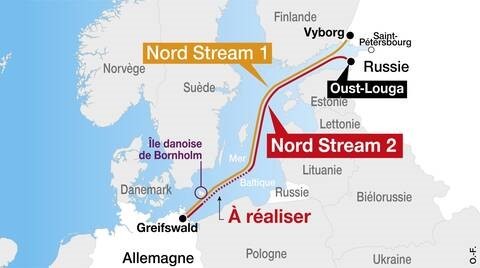Description

Copyright infringement is not intended
Context: In light of the tensions over Ukraine, the U.S. has said it will stop the Nord Stream if Russia attacks Ukraine.
- European countries, led by Germany, seemed reluctant initially to impose sanctions on the Nord Stream though it has now said sanctions are not off the table. This reluctance stems from the pipeline’s importance to Europe.
What is Nord Stream pipeline?
- It is the longest subsea export gas pipeline, which runs under the Baltic Sea carrying gas from Russia to Europe.
- Owned by: the Russian energy giant, Gazprom.
- Source region: The gas for Nord Steam comes mainly from the Bovanenkovo oil and gas condensate deposit in Western Siberia.
- Strategic significance:
- It bypasses transit countries, making it highly reliable for European customers.
- It crosses the Exclusive Economic Zones (EEZs) of several countries including Russia, Finland, Sweden, Denmark and Germany, and the territorial waters of Russia, Denmark, and Germany.
- In Germany, the pipeline connects to the OPAL (Baltic Sea Pipeline) and NEL (North European Pipeline) which further connects to the European grid.
- Twin Pipelines: Nord-stream consists of two pipelines
- Nord Stream 1 was completed in 2011 and runs from Vyborg in Leningrad to Lubmin near Greifswald, Germany.
- Nord Stream 2 which runs from Ust-Luga in Leningrad to Lubmin was completed in September 2021 and has the capacity to handle 55 billion cubic meters of gas per year once it becomes operational.
What are the objections to the pipeline?
- Environmental issues: Environmentalists argue that this pipeline does not fit in with German efforts to cut dependence on fossil fuels and fight climate change.
- Strategic Objection:
- S. argues that this project will make Europe too dependent on Russia i.e. increasing Russia’s influence in Europe. There is concern that Russia could use it as a geopolitical weapon.
- Ukraine argues that it will lose around $2 billion in transit fees once the pipeline becomes operational. As long as Russian gas transits through Ukraine, Russia is unlikely to intervene and cause instability in Ukraine.
- Poland and Belarus stand to lose transit fees and hence oppose the pipeline as it will bypass existing pipelines running through them.
Why is it important for Europe and Russia?
For Europe:
- Energy requirement:
- It requires more than 100 billion cubic metres (bcm) of natural gas each year and around 40% of its gas comes from Russia. Europe has become more dependent on gas imports because of a decrease in domestic gas production.
- Germany’s transition to cleaner fuels has increased its dependence on Russian gas as gas is seen as a cleaner fuel.
- No easy replacement:
- Reducing dependence on Russian gas is difficult as there are no easy replacements.
- There is no infrastructure to import LNG from exporters like Qatar and the U.S.
- Many European businesses have large investments in Nord Stream 2 and there is pressure on governments from these businesses.
- A reduction in gas from Russia would increase already high gas prices and that would not be popular domestically.
For Russia:
- With the largest natural gas reserves in the world, around 40% of its budget comes from sales of gas and oil.
What next?
- The Nord Stream 2 is being used as a bargaining chip by the West to force Russia to de-escalate tensions with Ukraine.
https://www.thehindu.com/news/international/explained-the-importance-of-the-nord-stream-pipeline/article38352754.ece?homepage=true
Array
(
[0] => daily-current-affairs/nord-stream-pipeline
[1] => daily-current-affairs
[2] => nord-stream-pipeline
)






